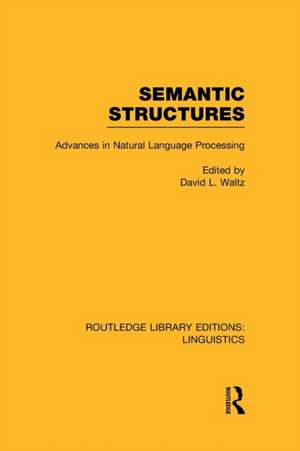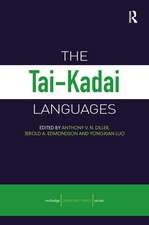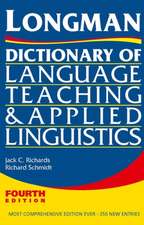Semantic Structures (RLE Linguistics B: Grammar): Advances in Natural Language Processing: Routledge Library Editions: Linguistics
Editat de David L. Waltzen Limba Engleză Paperback – 21 dec 2015
| Toate formatele și edițiile | Preț | Express |
|---|---|---|
| Paperback (1) | 416.22 lei 43-57 zile | |
| Taylor & Francis – 21 dec 2015 | 416.22 lei 43-57 zile | |
| Hardback (1) | 1001.07 lei 43-57 zile | |
| Taylor & Francis – 21 noi 2013 | 1001.07 lei 43-57 zile |
Din seria Routledge Library Editions: Linguistics
-
 Preț: 340.60 lei
Preț: 340.60 lei - 18%
 Preț: 1000.27 lei
Preț: 1000.27 lei - 18%
 Preț: 1002.63 lei
Preț: 1002.63 lei - 15%
 Preț: 671.56 lei
Preț: 671.56 lei - 18%
 Preț: 1002.63 lei
Preț: 1002.63 lei - 18%
 Preț: 1002.63 lei
Preț: 1002.63 lei - 18%
 Preț: 999.46 lei
Preț: 999.46 lei - 18%
 Preț: 777.70 lei
Preț: 777.70 lei - 34%
 Preț: 4327.12 lei
Preț: 4327.12 lei - 18%
 Preț: 1003.43 lei
Preț: 1003.43 lei - 15%
 Preț: 636.01 lei
Preț: 636.01 lei - 18%
 Preț: 1000.27 lei
Preț: 1000.27 lei - 34%
 Preț: 4048.76 lei
Preț: 4048.76 lei - 18%
 Preț: 1061.06 lei
Preț: 1061.06 lei - 18%
 Preț: 1061.81 lei
Preț: 1061.81 lei - 18%
 Preț: 781.64 lei
Preț: 781.64 lei - 18%
 Preț: 780.87 lei
Preț: 780.87 lei - 18%
 Preț: 890.56 lei
Preț: 890.56 lei - 18%
 Preț: 1001.84 lei
Preț: 1001.84 lei - 18%
 Preț: 1054.71 lei
Preț: 1054.71 lei - 18%
 Preț: 1001.84 lei
Preț: 1001.84 lei - 18%
 Preț: 1343.56 lei
Preț: 1343.56 lei - 18%
 Preț: 781.64 lei
Preț: 781.64 lei - 34%
 Preț: 5440.48 lei
Preț: 5440.48 lei - 18%
 Preț: 1001.07 lei
Preț: 1001.07 lei - 15%
 Preț: 670.77 lei
Preț: 670.77 lei - 18%
 Preț: 1001.84 lei
Preț: 1001.84 lei - 34%
 Preț: 2378.63 lei
Preț: 2378.63 lei - 18%
 Preț: 1060.25 lei
Preț: 1060.25 lei - 18%
 Preț: 1005.01 lei
Preț: 1005.01 lei - 18%
 Preț: 1000.27 lei
Preț: 1000.27 lei - 34%
 Preț: 1821.92 lei
Preț: 1821.92 lei - 18%
 Preț: 1002.63 lei
Preț: 1002.63 lei - 18%
 Preț: 1282.82 lei
Preț: 1282.82 lei - 18%
 Preț: 1062.62 lei
Preț: 1062.62 lei - 18%
 Preț: 1059.45 lei
Preț: 1059.45 lei - 18%
 Preț: 780.87 lei
Preț: 780.87 lei - 18%
 Preț: 1059.45 lei
Preț: 1059.45 lei - 18%
 Preț: 1001.07 lei
Preț: 1001.07 lei -
 Preț: 330.87 lei
Preț: 330.87 lei - 18%
 Preț: 1168.37 lei
Preț: 1168.37 lei - 18%
 Preț: 1060.25 lei
Preț: 1060.25 lei - 18%
 Preț: 1000.27 lei
Preț: 1000.27 lei - 18%
 Preț: 999.46 lei
Preț: 999.46 lei - 18%
 Preț: 1285.98 lei
Preț: 1285.98 lei - 15%
 Preț: 671.56 lei
Preț: 671.56 lei - 18%
 Preț: 1956.17 lei
Preț: 1956.17 lei - 34%
 Preț: 1293.09 lei
Preț: 1293.09 lei
Preț: 416.22 lei
Nou
Puncte Express: 624
Preț estimativ în valută:
79.65€ • 82.65$ • 66.58£
79.65€ • 82.65$ • 66.58£
Carte tipărită la comandă
Livrare economică 17-31 martie
Preluare comenzi: 021 569.72.76
Specificații
ISBN-13: 9781138981638
ISBN-10: 113898163X
Pagini: 248
Ilustrații: black & white illustrations
Dimensiuni: 156 x 234 x 13 mm
Greutate: 0.45 kg
Ediția:1
Editura: Taylor & Francis
Colecția Routledge
Seria Routledge Library Editions: Linguistics
Locul publicării:Oxford, United Kingdom
ISBN-10: 113898163X
Pagini: 248
Ilustrații: black & white illustrations
Dimensiuni: 156 x 234 x 13 mm
Greutate: 0.45 kg
Ediția:1
Editura: Taylor & Francis
Colecția Routledge
Seria Routledge Library Editions: Linguistics
Locul publicării:Oxford, United Kingdom
Cuprins
1. Knowledge Interactions and Integrated Parsing for Narrative Comprehension Michael G. Dyer 1.1. Introduction 1.2. Foundations in Comprehension 1.3. Multiple Knowledge Sources in BORIS 1.4. Generalizing Scripts with Multiple Perspectives 1.5. Processes of Comprehension 1.6. Memory Modification During Question Answering 1.7. Theory of Affect 1.8. Thematic Abstraction Units 1.9. Future Research 1.10. Conclusions 2. Event Concept Coherence Richard Alterman 2.1. Introduction 2.2. How NEXUS Works 2.3. In the Context of Some Other Representation Schemes 2.4. Summary and Conclusions 3. Learning Word Meanings From Examples Robert C. Berwick 3.1. Introduction 3.2. The Acquisition Procedure 3.3. Implementation and Examples 3.4. Learning Nouns and Class Hierarchies 3.5. Conclusions 4. An Introduction to Plot Units Wendy G. Lehnert and Cynthia L. Loiselle 4.1. Understanding and Representation 4.2. The Plot Unit Representational System 4.3. Summarization from Plot Units 4.4. Evidence for the Psychological Validity of Plot Units 4.5. An Overall View 5. Natural Language Description of Time-Varying Scenes Bernd Neumann 5.1. Overview 5.2. Representing the Scheme 5.3. Events 5.4. Verbalization 5.5. Composing a Description 5.6. Discussion
Descriere
Natural language understanding is central to the goals of artificial intelligence. Any truly intelligent machine must be capable of carrying on a conversation: dialogue, particularly clarification dialogue, is essential if we are to avoid disasters caused by the misunderstanding of the intelligent interactive systems of the future. This book is an interim report on the grand enterprise of devising a machine that can use natural language as fluently as a human. What has really been achieved since this goal was first formulated in Turing’s famous test? What obstacles still need to be overcome?










